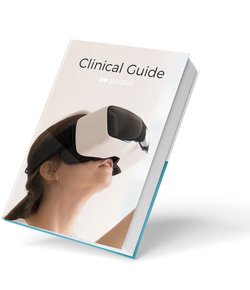
The free clinical guide for mental health professionals covers the fundamental concepts of why and how to apply VR in your therapy.

Take a quick look! Read the 1st chapter summary Yes, I want the Free Guide What you will learn:
- Discover all the benefits and scientific basis of VR for Therapy.
- Learn how to apply VR to treat anxiety, phobias, and other mental conditions such as OCD, PTSD, and ADHD.
- See real clinical cases where other therapists used VR to treat their patients more effectively.
A complete document created by psychologists and VR experts that contains scientific concepts, benefits, clinical cases, intervention protocol, how are VR Therapy in every session, and frequently asked questions to apply VR to treat multiple mental conditions.You will learn:
- Introduction to VR therapy.
- Benefits and scientific studies of VR in mental health.
- Specific recommendations and user manual for the therapeutic process.
- Guide of how to prepare a VR Therapy session.
- Key tools to apply VR.
- The therapeutic potential of VR in mental health.
- Real clinical cases from psychologists that use VR daily.
- Bibliography and FAQ.
Not sure yet? Take a quick look!
1. What is virtual reality and how to apply it in therapy
Virtual reality (VR) and augmented reality (AR) are part of the so-called Information and Communication Technologies (ICTs), and can be defined as a set of three-dimensional environments with which a person interacts in real-time, which generate a sense of immersion similar to that of a real situation. Sense of presence and interaction with the environment are, in fact, the characteristic components of technology. In psychotherapy, virtual environments allow us not only to reproduce relevant stimulation configurations for mental health intervention but also the possibility of manipulating certain variables in order to control and adapt the intervention to our patient’s characteristics. This technology allows us on certain occasions to work in a way that cannot reproduced in actual life. It is a tool that can facilitate the application of psychological evaluation and intervention protocols. However, it is essential to point out that ICTs alone do not produce a therapeutic change. Therefore, the use of past environments within psychological evaluation and intervention protocols that have shown empirical evidence is essential (for an overview, see, for example, Daset, Lilian R. and Cracco, Cecilia, 2013). Research in psychology already has a broad empirical base that includes virtual reality or augmented reality protocols, which have proven their therapeutic efficiency (see, for example, Botella et al., 2012) ....
Get the complete Clinical Guide

You should also check out the following articles:
- VR BUYING GUIDE AND THE BEST VR HEADSET FOR 2022
- A meta market opportunity: The metaverse could soon be worth $1 trillion
- Facebook wants to build a metaverse. Microsoft is creating something even more ambitious.
- How to succeed in the virtual reality world of tomorrow?
- Books you must read about virtual reality
- Best New Augmented Reality Books To Read In 2021
- US$ 4.7 Billion- The global augmented reality gaming market
- The smart glasses revolution is about to get real
- Consumer Brands Reinventing Marketing in the Metaverse
- Imagine Making Money in Rec Room
- The biggest AR and VR predictions of 2022
- Apple hired Meta's AR communications lead ahead of the 2022 launch of the headset.
- Who Will Be in Charge of the Metaverse?
- The Kingdom of Abraham: The first Jewish metaverse
- Gen Z are planning to spend thousands on cryptocurrency, NFTs and metaverse
- According to Goldman Sachs, the metaverse must run on blockchain
- What You Can Create With a Small Piece of Land in the Metaverse
- How To Buy Land In The Metaverse?



